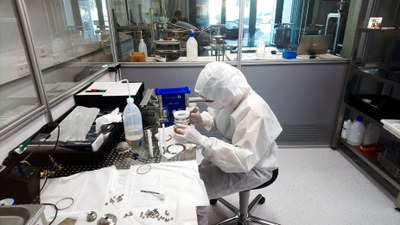ULTIMATE
Within the ERC-funded project ULTIMATE, we perform R&D towards the ultimate dark matter detector based on a dual-phase liquid xenon TPC. Such detector, maybe realized within the DARWIN framework, will have a target mass of ~40t of liquid xenon. Its sensitivity will start to be limited by coherent neutrino-nucleus interactions, a background which cannot be reduced by shielding.
The ULTIMATE team consists of 2 professors, 1 PostDoc, 3 PhD students and several BSc and MSc students. We address the following questions:
- How can we achieve the strict Rn-background requirements for DARWIN?
→We study an alternative detector design and work on improved material selection - How can we reduce the neutron background originating from PTFE?
→The (no so) simple trick is to use less and cleaner PTFE. - Can we improve the design of the TPC to reduce these backgrounds?
→We are currently investigating this question. - Are there better alternatives to the dual-phase charge readout?
→ An approach where the scintillation light is created in the liquid might solve some known problems. - Which (non-WIMP) science channels can be addressed by DARWIN?
→We are making detailed background studies to estimate DARWIN's sensitivity for WIMPs and other dark matter candidates and also focus on neutrino science. - Which shields are required for DARWIN?
→This is an important question to select the site of a real experiment.
Some of these projects are pursued in our new laboratory in Freiburg. This unique building was re-furbished for our group recently and provides ideal conditions for large- and small-scale prototypes. It is equipped with a small class ISO-6 cleanroom.
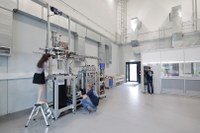 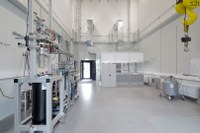 |
|||||||
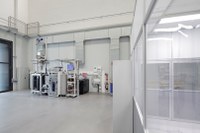 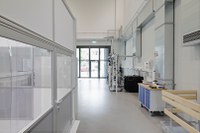 |
|||||||
| Fotos: Oliver Kern (www.okdv.de), Architect: Roger Gerber Please click on images to enlarge them. |
The photo below shows one of our team members in the cleanroom, putting together a small-scale liquid xenon time projection chamber which shows some features that have never been tested before.
| The project is funded by an ERC Consolidator Grant from the European Commission, project number 724320. | 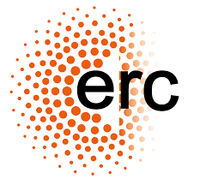 |
|


